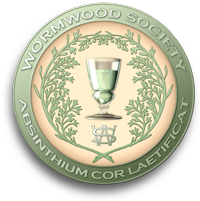Absinthism: fictitious 19th century syndrome - Reviewed by Experts and Consumers at The Wormwood Society
Absinthism: fictitious 19th century syndrome
Abstract
Absinthe, a bitter spirit containing wormwood (Artemisia absinthium L.), was banned at the beginning of the 20th century as consequence of its supposed unique adverse effects. After nearly centurylong prohibition, absinthe has seen a resurgence after recent de-restriction in many European countries. This review provides information on the history of absinthe and one of its constituent, thujone. Medical and toxicological aspects experienced and discovered before the prohibition of absinthe are discussed in detail, along with their impact on the current situation. The only consistent conclusion that can be drawn from those 19th century studies about absinthism is that wormwood oil but not absinthe is a potent agent to cause seizures. Neither can it be concluded that the beverage itself was epileptogenic nor that the so-called absinthism can exactly be distinguished as a distinct syndrome from chronic alcoholism.
